Knowledge Management: Strategies, Recommendations, and Ethics
VerifiedAdded on 2021/05/31
|8
|1477
|52
Report
AI Summary
This report provides a comprehensive overview of knowledge management, defining it as the process of converting tacit knowledge into explicit knowledge for organizational value. It emphasizes the shift in perspective, highlighting knowledge as a shared tool for organizational growth and competitiveness. The report explores the understanding of knowledge within an organizational context, differentiating between data, information, and knowledge. It also discusses the importance of knowledge assessment as a competitive advantage, differentiating between explicit and tacit knowledge. The report suggests recommendations such as workflow monitoring software and challenge identification mechanisms. Ethical considerations, such as the misuse of employee knowledge, are also addressed. Finally, the report emphasizes the importance of viable decision-making processes, especially regarding tacit knowledge, and the complementary relationship between tacit and explicit knowledge.
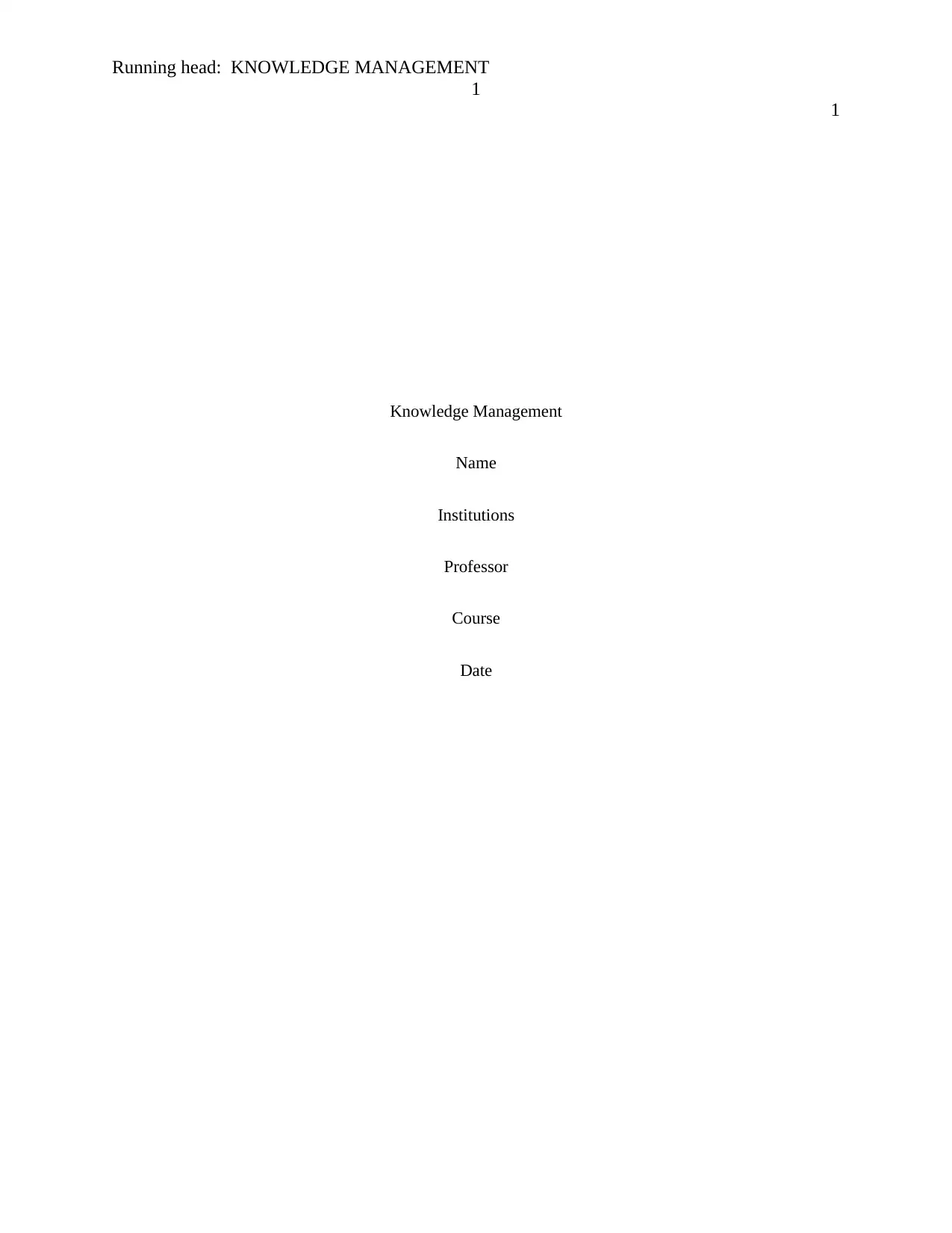
Running head: KNOWLEDGE MANAGEMENT
1
1
Knowledge Management
Name
Institutions
Professor
Course
Date
1
1
Knowledge Management
Name
Institutions
Professor
Course
Date
Paraphrase This Document
Need a fresh take? Get an instant paraphrase of this document with our AI Paraphraser
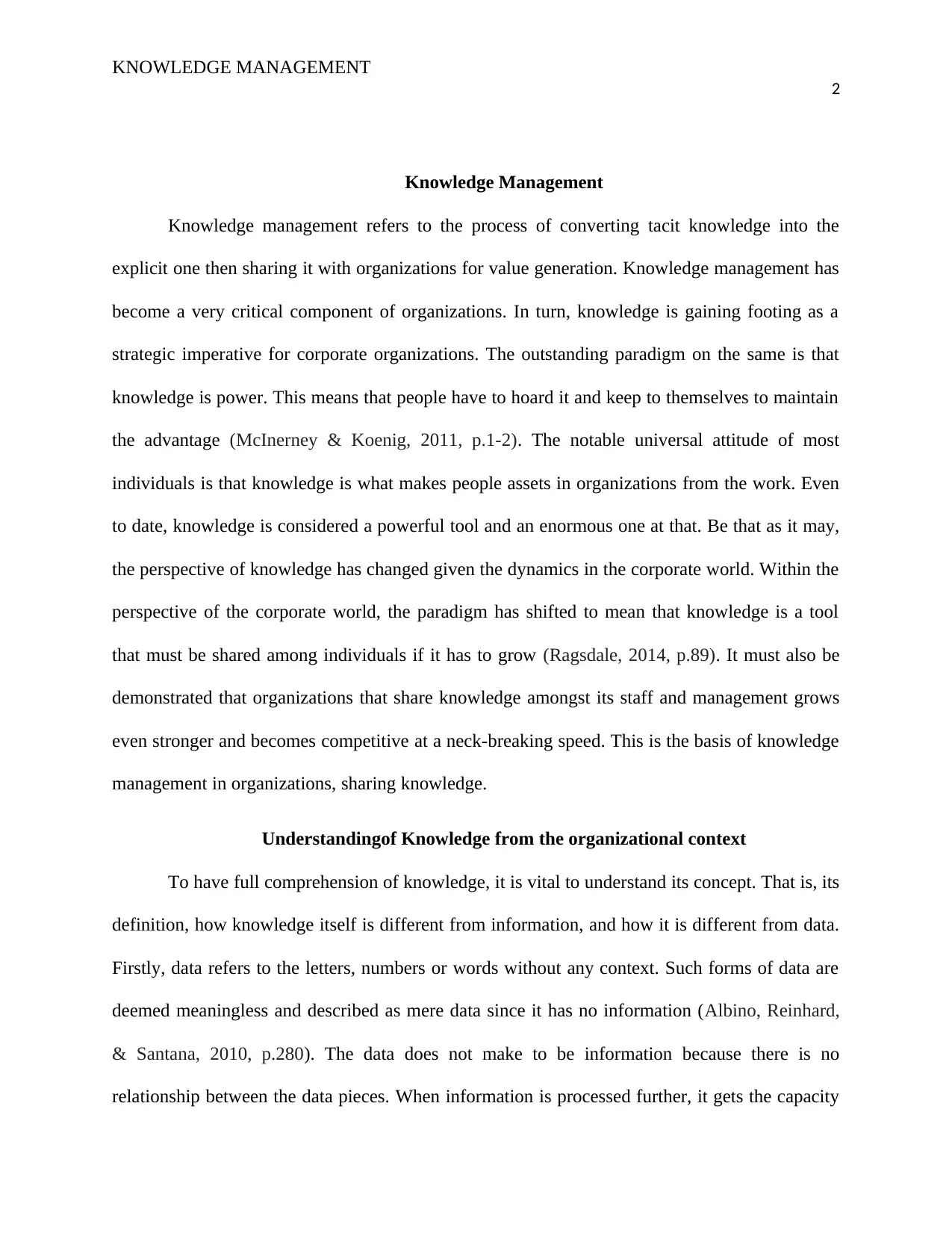
KNOWLEDGE MANAGEMENT
2
Knowledge Management
Knowledge management refers to the process of converting tacit knowledge into the
explicit one then sharing it with organizations for value generation. Knowledge management has
become a very critical component of organizations. In turn, knowledge is gaining footing as a
strategic imperative for corporate organizations. The outstanding paradigm on the same is that
knowledge is power. This means that people have to hoard it and keep to themselves to maintain
the advantage (McInerney & Koenig, 2011, p.1-2). The notable universal attitude of most
individuals is that knowledge is what makes people assets in organizations from the work. Even
to date, knowledge is considered a powerful tool and an enormous one at that. Be that as it may,
the perspective of knowledge has changed given the dynamics in the corporate world. Within the
perspective of the corporate world, the paradigm has shifted to mean that knowledge is a tool
that must be shared among individuals if it has to grow (Ragsdale, 2014, p.89). It must also be
demonstrated that organizations that share knowledge amongst its staff and management grows
even stronger and becomes competitive at a neck-breaking speed. This is the basis of knowledge
management in organizations, sharing knowledge.
Understandingof Knowledge from the organizational context
To have full comprehension of knowledge, it is vital to understand its concept. That is, its
definition, how knowledge itself is different from information, and how it is different from data.
Firstly, data refers to the letters, numbers or words without any context. Such forms of data are
deemed meaningless and described as mere data since it has no information (Albino, Reinhard,
& Santana, 2010, p.280). The data does not make to be information because there is no
relationship between the data pieces. When information is processed further, it gets the capacity
2
Knowledge Management
Knowledge management refers to the process of converting tacit knowledge into the
explicit one then sharing it with organizations for value generation. Knowledge management has
become a very critical component of organizations. In turn, knowledge is gaining footing as a
strategic imperative for corporate organizations. The outstanding paradigm on the same is that
knowledge is power. This means that people have to hoard it and keep to themselves to maintain
the advantage (McInerney & Koenig, 2011, p.1-2). The notable universal attitude of most
individuals is that knowledge is what makes people assets in organizations from the work. Even
to date, knowledge is considered a powerful tool and an enormous one at that. Be that as it may,
the perspective of knowledge has changed given the dynamics in the corporate world. Within the
perspective of the corporate world, the paradigm has shifted to mean that knowledge is a tool
that must be shared among individuals if it has to grow (Ragsdale, 2014, p.89). It must also be
demonstrated that organizations that share knowledge amongst its staff and management grows
even stronger and becomes competitive at a neck-breaking speed. This is the basis of knowledge
management in organizations, sharing knowledge.
Understandingof Knowledge from the organizational context
To have full comprehension of knowledge, it is vital to understand its concept. That is, its
definition, how knowledge itself is different from information, and how it is different from data.
Firstly, data refers to the letters, numbers or words without any context. Such forms of data are
deemed meaningless and described as mere data since it has no information (Albino, Reinhard,
& Santana, 2010, p.280). The data does not make to be information because there is no
relationship between the data pieces. When information is processed further, it gets the capacity
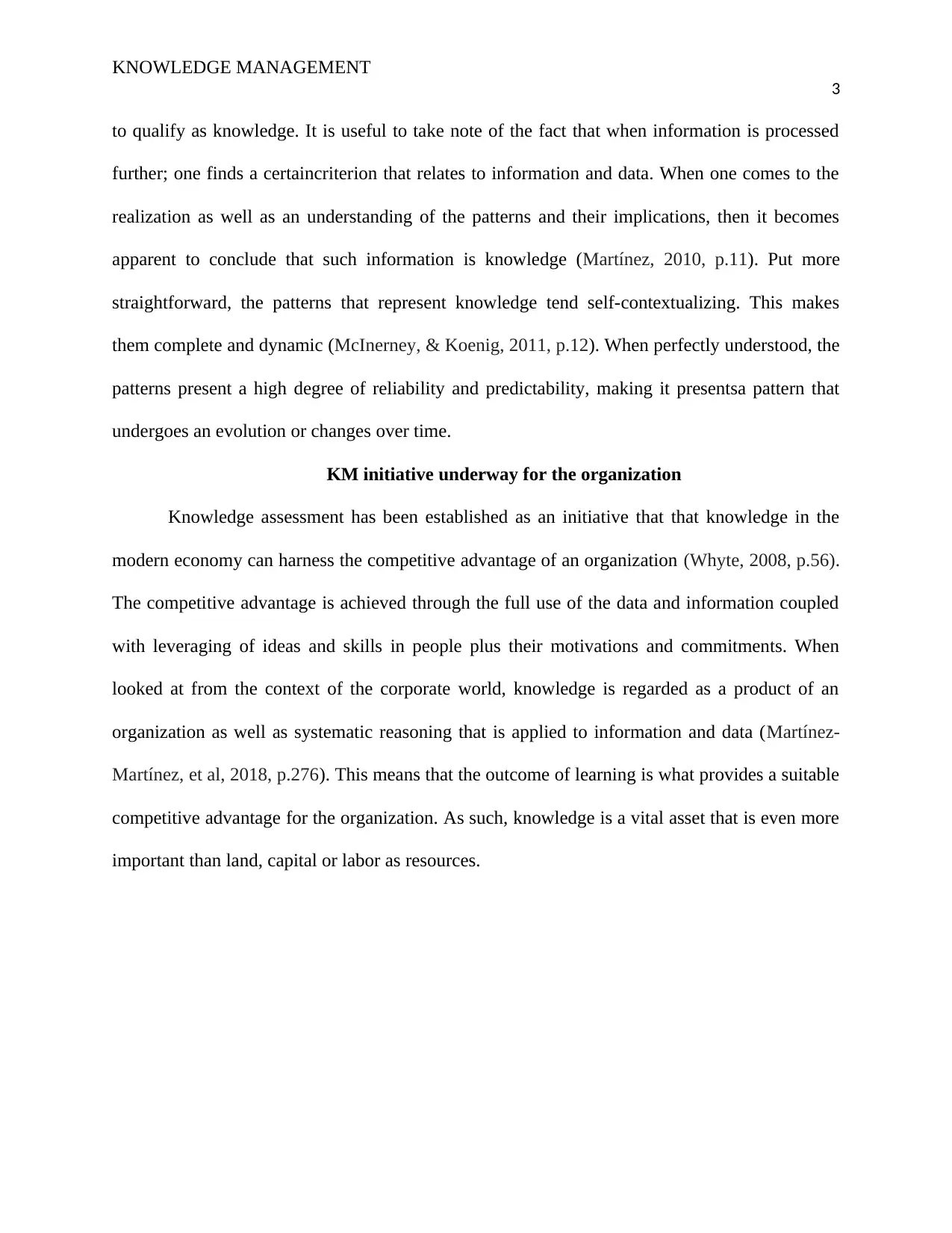
KNOWLEDGE MANAGEMENT
3
to qualify as knowledge. It is useful to take note of the fact that when information is processed
further; one finds a certaincriterion that relates to information and data. When one comes to the
realization as well as an understanding of the patterns and their implications, then it becomes
apparent to conclude that such information is knowledge (Martínez, 2010, p.11). Put more
straightforward, the patterns that represent knowledge tend self-contextualizing. This makes
them complete and dynamic (McInerney, & Koenig, 2011, p.12). When perfectly understood, the
patterns present a high degree of reliability and predictability, making it presentsa pattern that
undergoes an evolution or changes over time.
KM initiative underway for the organization
Knowledge assessment has been established as an initiative that that knowledge in the
modern economy can harness the competitive advantage of an organization (Whyte, 2008, p.56).
The competitive advantage is achieved through the full use of the data and information coupled
with leveraging of ideas and skills in people plus their motivations and commitments. When
looked at from the context of the corporate world, knowledge is regarded as a product of an
organization as well as systematic reasoning that is applied to information and data (Martínez-
Martínez, et al, 2018, p.276). This means that the outcome of learning is what provides a suitable
competitive advantage for the organization. As such, knowledge is a vital asset that is even more
important than land, capital or labor as resources.
3
to qualify as knowledge. It is useful to take note of the fact that when information is processed
further; one finds a certaincriterion that relates to information and data. When one comes to the
realization as well as an understanding of the patterns and their implications, then it becomes
apparent to conclude that such information is knowledge (Martínez, 2010, p.11). Put more
straightforward, the patterns that represent knowledge tend self-contextualizing. This makes
them complete and dynamic (McInerney, & Koenig, 2011, p.12). When perfectly understood, the
patterns present a high degree of reliability and predictability, making it presentsa pattern that
undergoes an evolution or changes over time.
KM initiative underway for the organization
Knowledge assessment has been established as an initiative that that knowledge in the
modern economy can harness the competitive advantage of an organization (Whyte, 2008, p.56).
The competitive advantage is achieved through the full use of the data and information coupled
with leveraging of ideas and skills in people plus their motivations and commitments. When
looked at from the context of the corporate world, knowledge is regarded as a product of an
organization as well as systematic reasoning that is applied to information and data (Martínez-
Martínez, et al, 2018, p.276). This means that the outcome of learning is what provides a suitable
competitive advantage for the organization. As such, knowledge is a vital asset that is even more
important than land, capital or labor as resources.
⊘ This is a preview!⊘
Do you want full access?
Subscribe today to unlock all pages.

Trusted by 1+ million students worldwide
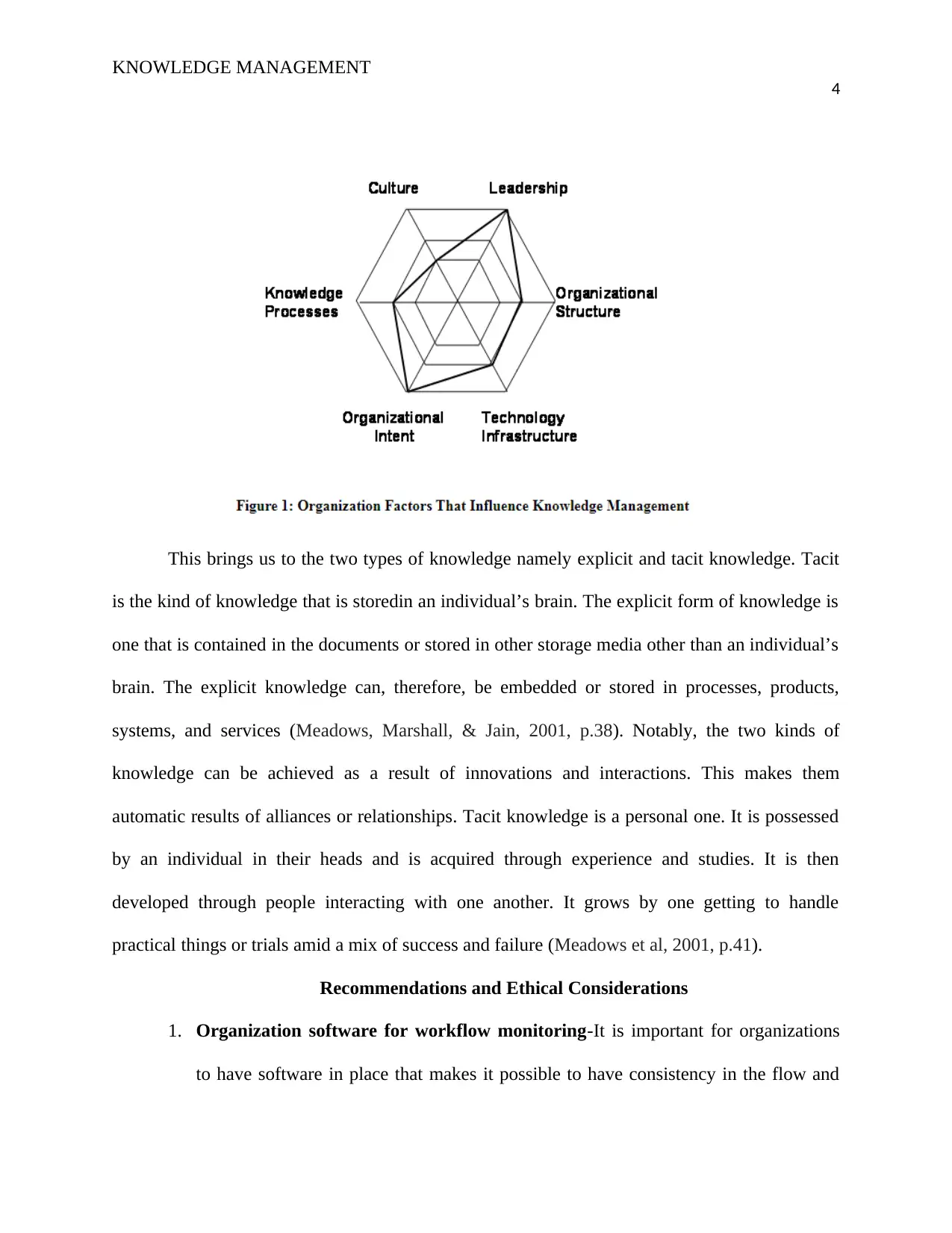
KNOWLEDGE MANAGEMENT
4
This brings us to the two types of knowledge namely explicit and tacit knowledge. Tacit
is the kind of knowledge that is storedin an individual’s brain. The explicit form of knowledge is
one that is contained in the documents or stored in other storage media other than an individual’s
brain. The explicit knowledge can, therefore, be embedded or stored in processes, products,
systems, and services (Meadows, Marshall, & Jain, 2001, p.38). Notably, the two kinds of
knowledge can be achieved as a result of innovations and interactions. This makes them
automatic results of alliances or relationships. Tacit knowledge is a personal one. It is possessed
by an individual in their heads and is acquired through experience and studies. It is then
developed through people interacting with one another. It grows by one getting to handle
practical things or trials amid a mix of success and failure (Meadows et al, 2001, p.41).
Recommendations and Ethical Considerations
1. Organization software for workflow monitoring-It is important for organizations
to have software in place that makes it possible to have consistency in the flow and
4
This brings us to the two types of knowledge namely explicit and tacit knowledge. Tacit
is the kind of knowledge that is storedin an individual’s brain. The explicit form of knowledge is
one that is contained in the documents or stored in other storage media other than an individual’s
brain. The explicit knowledge can, therefore, be embedded or stored in processes, products,
systems, and services (Meadows, Marshall, & Jain, 2001, p.38). Notably, the two kinds of
knowledge can be achieved as a result of innovations and interactions. This makes them
automatic results of alliances or relationships. Tacit knowledge is a personal one. It is possessed
by an individual in their heads and is acquired through experience and studies. It is then
developed through people interacting with one another. It grows by one getting to handle
practical things or trials amid a mix of success and failure (Meadows et al, 2001, p.41).
Recommendations and Ethical Considerations
1. Organization software for workflow monitoring-It is important for organizations
to have software in place that makes it possible to have consistency in the flow and
Paraphrase This Document
Need a fresh take? Get an instant paraphrase of this document with our AI Paraphraser
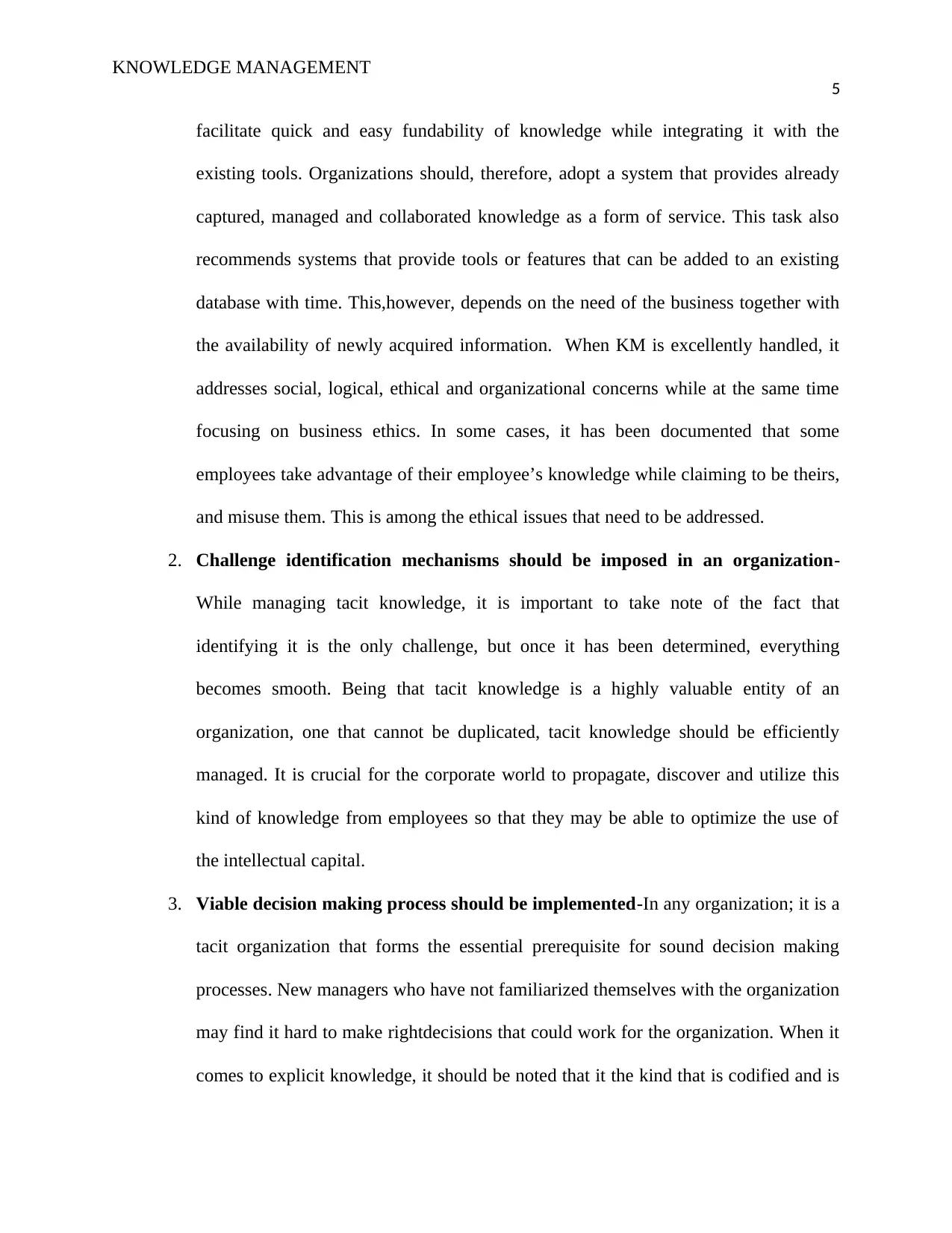
KNOWLEDGE MANAGEMENT
5
facilitate quick and easy fundability of knowledge while integrating it with the
existing tools. Organizations should, therefore, adopt a system that provides already
captured, managed and collaborated knowledge as a form of service. This task also
recommends systems that provide tools or features that can be added to an existing
database with time. This,however, depends on the need of the business together with
the availability of newly acquired information. When KM is excellently handled, it
addresses social, logical, ethical and organizational concerns while at the same time
focusing on business ethics. In some cases, it has been documented that some
employees take advantage of their employee’s knowledge while claiming to be theirs,
and misuse them. This is among the ethical issues that need to be addressed.
2. Challenge identification mechanisms should be imposed in an organization-
While managing tacit knowledge, it is important to take note of the fact that
identifying it is the only challenge, but once it has been determined, everything
becomes smooth. Being that tacit knowledge is a highly valuable entity of an
organization, one that cannot be duplicated, tacit knowledge should be efficiently
managed. It is crucial for the corporate world to propagate, discover and utilize this
kind of knowledge from employees so that they may be able to optimize the use of
the intellectual capital.
3. Viable decision making process should be implemented-In any organization; it is a
tacit organization that forms the essential prerequisite for sound decision making
processes. New managers who have not familiarized themselves with the organization
may find it hard to make rightdecisions that could work for the organization. When it
comes to explicit knowledge, it should be noted that it the kind that is codified and is
5
facilitate quick and easy fundability of knowledge while integrating it with the
existing tools. Organizations should, therefore, adopt a system that provides already
captured, managed and collaborated knowledge as a form of service. This task also
recommends systems that provide tools or features that can be added to an existing
database with time. This,however, depends on the need of the business together with
the availability of newly acquired information. When KM is excellently handled, it
addresses social, logical, ethical and organizational concerns while at the same time
focusing on business ethics. In some cases, it has been documented that some
employees take advantage of their employee’s knowledge while claiming to be theirs,
and misuse them. This is among the ethical issues that need to be addressed.
2. Challenge identification mechanisms should be imposed in an organization-
While managing tacit knowledge, it is important to take note of the fact that
identifying it is the only challenge, but once it has been determined, everything
becomes smooth. Being that tacit knowledge is a highly valuable entity of an
organization, one that cannot be duplicated, tacit knowledge should be efficiently
managed. It is crucial for the corporate world to propagate, discover and utilize this
kind of knowledge from employees so that they may be able to optimize the use of
the intellectual capital.
3. Viable decision making process should be implemented-In any organization; it is a
tacit organization that forms the essential prerequisite for sound decision making
processes. New managers who have not familiarized themselves with the organization
may find it hard to make rightdecisions that could work for the organization. When it
comes to explicit knowledge, it should be noted that it the kind that is codified and is
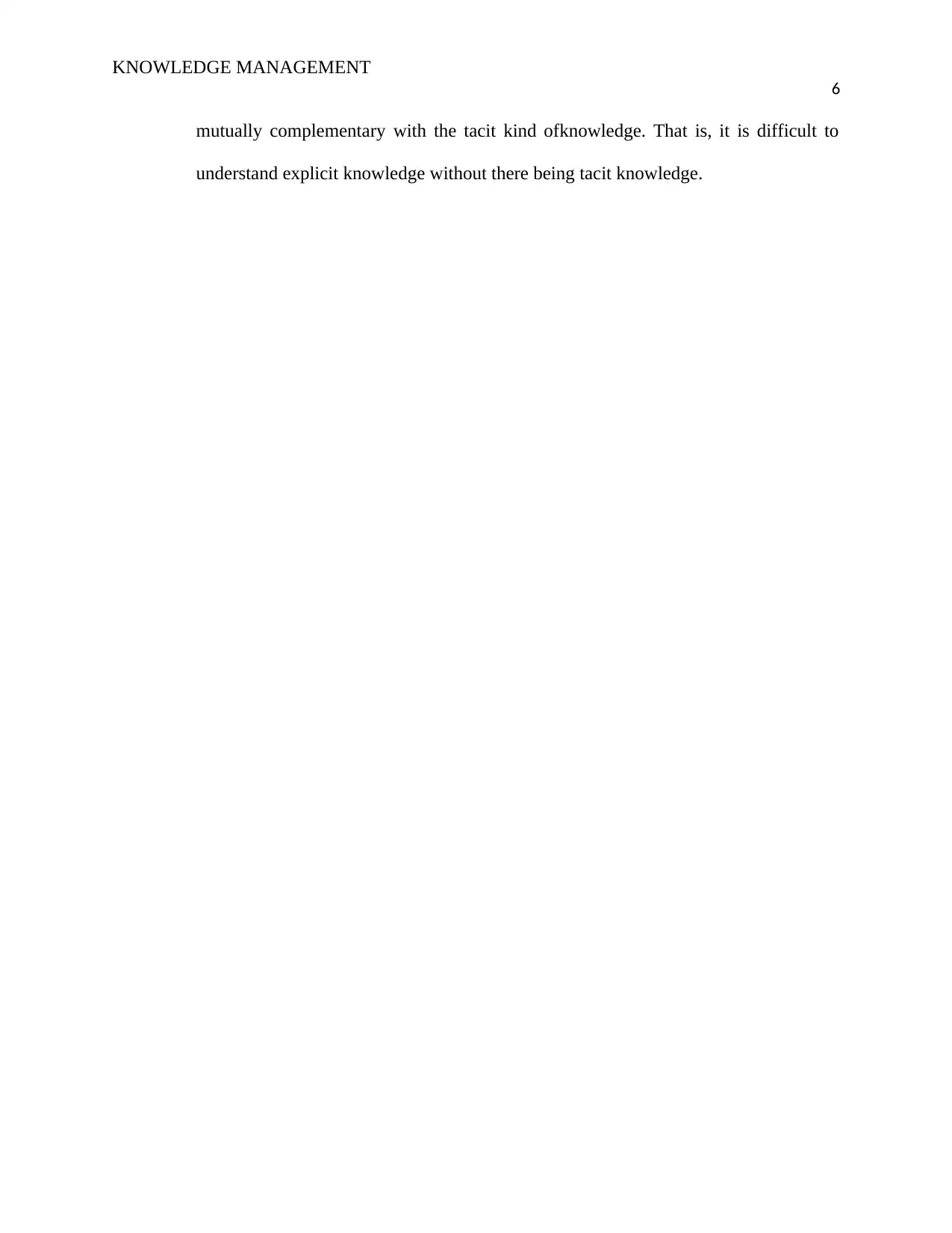
KNOWLEDGE MANAGEMENT
6
mutually complementary with the tacit kind ofknowledge. That is, it is difficult to
understand explicit knowledge without there being tacit knowledge.
6
mutually complementary with the tacit kind ofknowledge. That is, it is difficult to
understand explicit knowledge without there being tacit knowledge.
⊘ This is a preview!⊘
Do you want full access?
Subscribe today to unlock all pages.

Trusted by 1+ million students worldwide
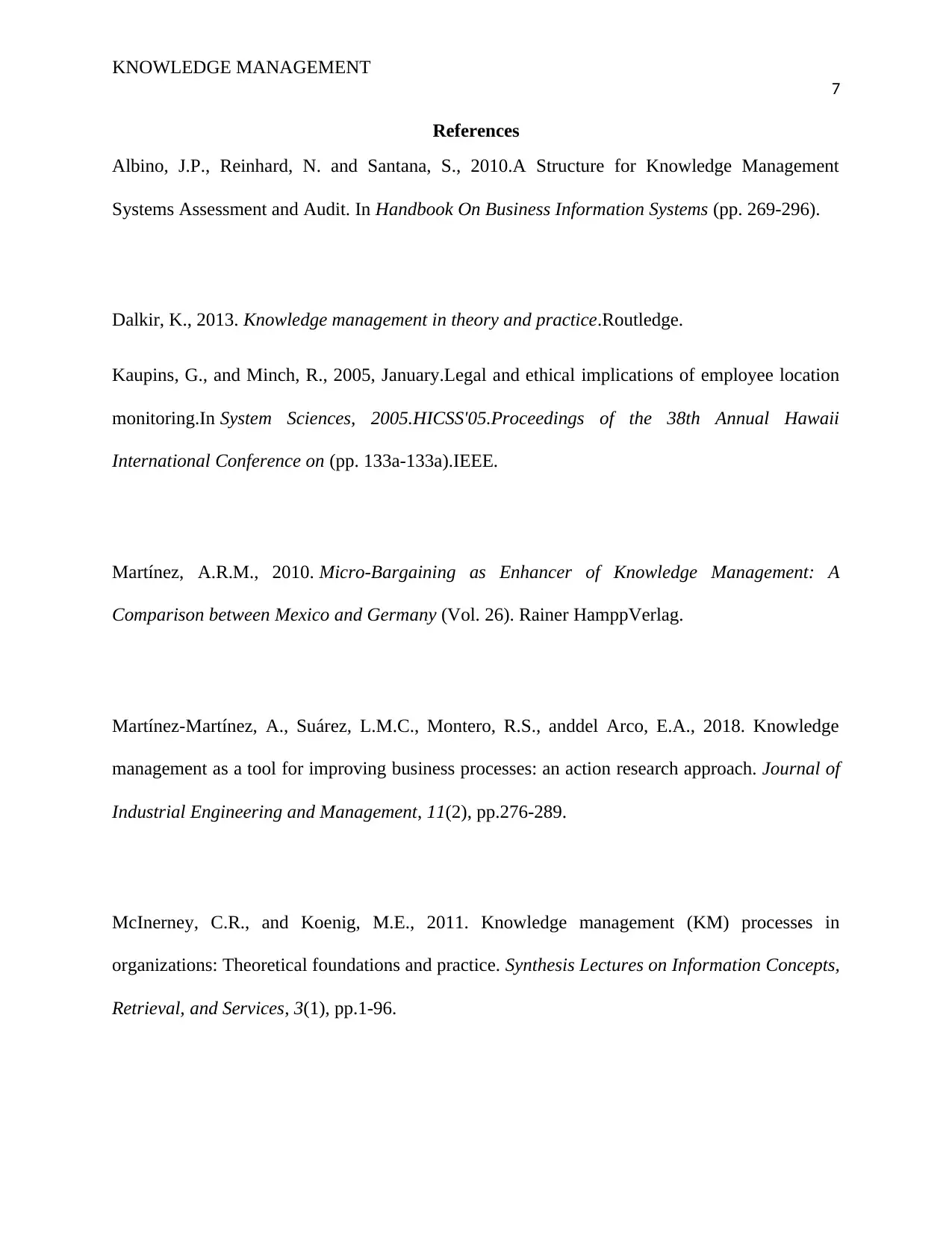
KNOWLEDGE MANAGEMENT
7
References
Albino, J.P., Reinhard, N. and Santana, S., 2010.A Structure for Knowledge Management
Systems Assessment and Audit. In Handbook On Business Information Systems (pp. 269-296).
Dalkir, K., 2013. Knowledge management in theory and practice.Routledge.
Kaupins, G., and Minch, R., 2005, January.Legal and ethical implications of employee location
monitoring.In System Sciences, 2005.HICSS'05.Proceedings of the 38th Annual Hawaii
International Conference on (pp. 133a-133a).IEEE.
Martínez, A.R.M., 2010. Micro-Bargaining as Enhancer of Knowledge Management: A
Comparison between Mexico and Germany (Vol. 26). Rainer HamppVerlag.
Martínez-Martínez, A., Suárez, L.M.C., Montero, R.S., anddel Arco, E.A., 2018. Knowledge
management as a tool for improving business processes: an action research approach. Journal of
Industrial Engineering and Management, 11(2), pp.276-289.
McInerney, C.R., and Koenig, M.E., 2011. Knowledge management (KM) processes in
organizations: Theoretical foundations and practice. Synthesis Lectures on Information Concepts,
Retrieval, and Services, 3(1), pp.1-96.
7
References
Albino, J.P., Reinhard, N. and Santana, S., 2010.A Structure for Knowledge Management
Systems Assessment and Audit. In Handbook On Business Information Systems (pp. 269-296).
Dalkir, K., 2013. Knowledge management in theory and practice.Routledge.
Kaupins, G., and Minch, R., 2005, January.Legal and ethical implications of employee location
monitoring.In System Sciences, 2005.HICSS'05.Proceedings of the 38th Annual Hawaii
International Conference on (pp. 133a-133a).IEEE.
Martínez, A.R.M., 2010. Micro-Bargaining as Enhancer of Knowledge Management: A
Comparison between Mexico and Germany (Vol. 26). Rainer HamppVerlag.
Martínez-Martínez, A., Suárez, L.M.C., Montero, R.S., anddel Arco, E.A., 2018. Knowledge
management as a tool for improving business processes: an action research approach. Journal of
Industrial Engineering and Management, 11(2), pp.276-289.
McInerney, C.R., and Koenig, M.E., 2011. Knowledge management (KM) processes in
organizations: Theoretical foundations and practice. Synthesis Lectures on Information Concepts,
Retrieval, and Services, 3(1), pp.1-96.
Paraphrase This Document
Need a fresh take? Get an instant paraphrase of this document with our AI Paraphraser
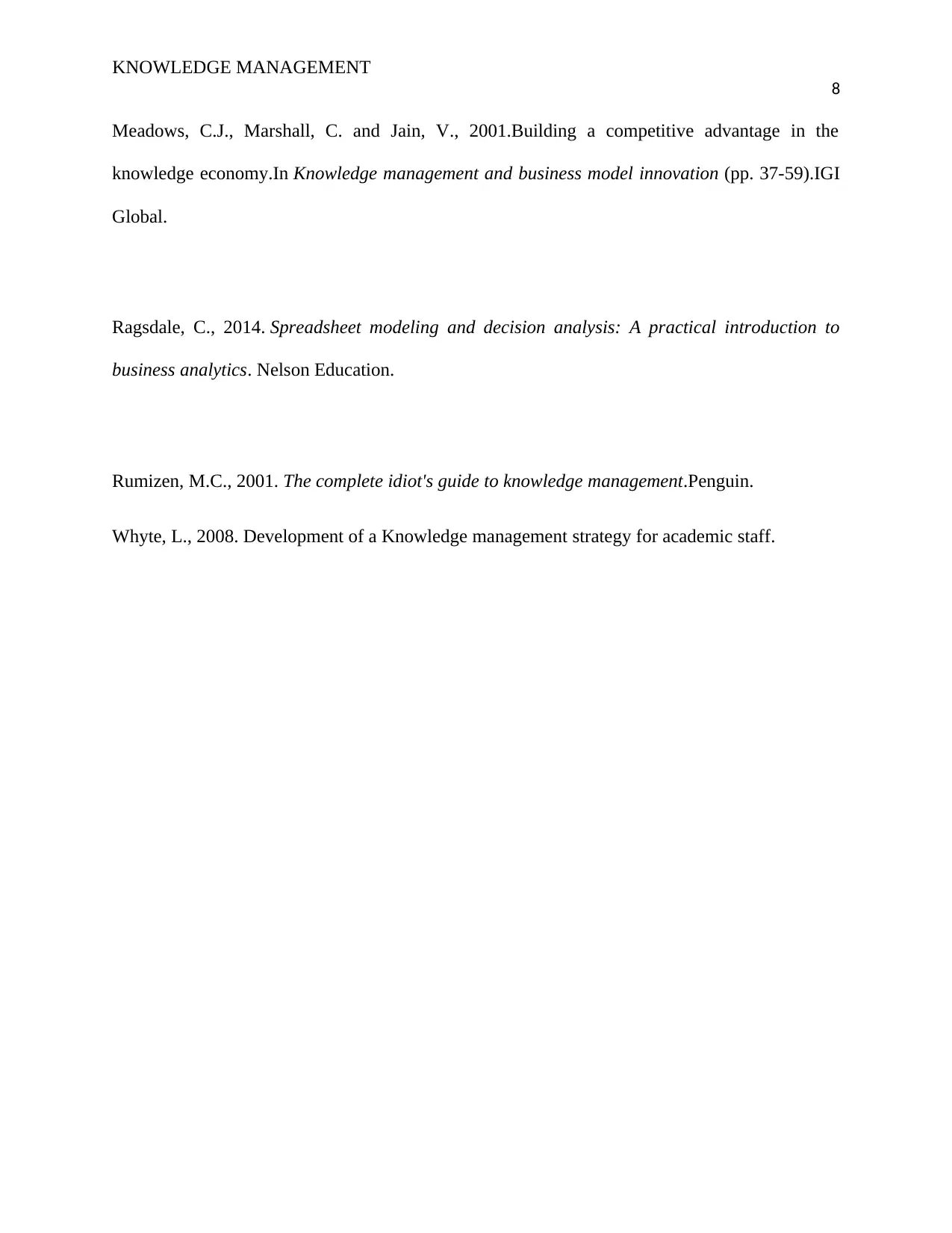
KNOWLEDGE MANAGEMENT
8
Meadows, C.J., Marshall, C. and Jain, V., 2001.Building a competitive advantage in the
knowledge economy.In Knowledge management and business model innovation (pp. 37-59).IGI
Global.
Ragsdale, C., 2014. Spreadsheet modeling and decision analysis: A practical introduction to
business analytics. Nelson Education.
Rumizen, M.C., 2001. The complete idiot's guide to knowledge management.Penguin.
Whyte, L., 2008. Development of a Knowledge management strategy for academic staff.
8
Meadows, C.J., Marshall, C. and Jain, V., 2001.Building a competitive advantage in the
knowledge economy.In Knowledge management and business model innovation (pp. 37-59).IGI
Global.
Ragsdale, C., 2014. Spreadsheet modeling and decision analysis: A practical introduction to
business analytics. Nelson Education.
Rumizen, M.C., 2001. The complete idiot's guide to knowledge management.Penguin.
Whyte, L., 2008. Development of a Knowledge management strategy for academic staff.
1 out of 8
Related Documents
Your All-in-One AI-Powered Toolkit for Academic Success.
+13062052269
info@desklib.com
Available 24*7 on WhatsApp / Email
![[object Object]](/_next/static/media/star-bottom.7253800d.svg)
Unlock your academic potential
Copyright © 2020–2026 A2Z Services. All Rights Reserved. Developed and managed by ZUCOL.





